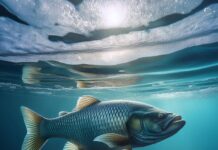DENVER, Colo. – Colorado Parks and Wildlife and their partners continue to intercept boats infested with zebra or quagga mussels as the boating season gets underway. Some recent infested boats were intercepted coming into Colorado from out of state prior to launching at Blue Mesa, Boulder, Chatfield, Horsetooth and McPhee Reservoirs.
CPW’s Aquatic Nuisance Species program and their partners have intercepted 11 boats infested with zebra and quagga mussels this year. The infested boats came to Colorado from Arizona, Kansas, Kentucky, Minnesota, Missouri, Nevada, Texas, and Utah (Lake Powell).
Interceptions of boats contaminated with invasive mussels have increased every year and continues to increase as the infestations in other states spread. Inspectors remain on high alert and continue to work with boaters to prevent invasive mussels from getting into Colorado.
“We are on record pace for mussel boat interceptions this year and two of these waters had never intercepted an infested mussel boat in the past,” said Robert Walters, CPW’s invasive species specialist. “This is a testament to the increased risk and challenges we face in protecting Colorado’s waters from these invasive species.”
There are no waters positive for zebra or quagga mussels in Colorado, so all mussel boat interceptions are coming into Colorado from out of state. However, they are not all out of state registered boaters visiting Colorado. Many of the boats intercepted are Colorado residents that take their boats out of state and then return home with invasive mussels attached.
“The pubic remains a primary partner in the fight to keep mussels out of our waters,” said Elizabeth Brown, CPW invasive species coordinator. “We appreciate the public’s honesty and cooperation when bringing watercraft and equipment into Colorado, so we can continue to work together to keep our waters free of zebra and quagga mussels and other harmful invasives.”
Zebra and quagga mussels are among the worst invasive species in the nation and pose a great ecological and financial threat to the state. The invasive mussels are transported great distances over land by attaching to recreational watercraft and equipment. They clog water infrastructure necessary to supply water to homes, farms, ranches, hydropower facilities and for industrial uses. They can cause irreversible harm to natural resources by reducing water quality, disrupting the aquatic food web ultimately harming fisheries and negatively affecting the ecosystem. Mussels can foul watercraft and damage engines and motors. These impacts cost the nation billions of dollars per year to mitigate.
“The invasion of zebra and quagga mussels can affect every Coloradan in some way,” said Reid DeWalt, CPW assistant director for wildlife and natural resources. “We need all residents and visitors to help protect our waters from invasive species.”
Colorado Parks and Wildlife reminds the public they can help stop the spread of aquatic nuisance species in Colorado and the western United States. Colorado regulations require boaters to clean, drain and dry before entering and when leaving any lake or reservoir:
- Clean: Remove all plants, animals, and mud from boats, trailers, vehicle hitches, and motors. Aquatic plant fragments and animals can hide in mud and survive many days out of water. It is prohibited to transport watercraft over land with aquatic vegetation on it. Be sure to clean all fishing equipment including waders and boots.
- Drain: Completely drain every space or item that could hold water, including live wells, bait containers, ballast, bilge and engines. Boat operators are required to remove all water drain plugs prior to leaving the boat ramp or parking lot, and that drain plugs are left out during transport and any time the watercraft is not on the water.
- Dry: Allow sufficient time for boats and equipment to dry completely before launching in other waters.
- Dispose: Properly dispose unused live bait into trash containers, not into the water. Properly dispose of aquarium or classroom animals or plants, do not place them in any body of water or natural setting.
- Report: If you find anything that you think is an invasive species on your boat or in a water body, report it to the CPW by calling (303) 291-7295 or emailing [email protected].
For more information about invasive species or boat inspections, please visit http://cpw.state.co.us. Keeping your watercraft, trailer, anchor, and recreational equipment clean, drained and dry will prevent the spread of harmful ANS.




